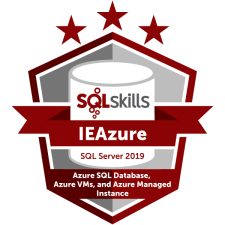Overview
This 3/400-level, SQL Server training class is designed to help you gain a deep understanding about Microsoft Azure, including Azure virtual machines, Azure SQL Database, and Azure SQL Managed Instance.
The class will give you a wealth of practical knowledge on creating and configuring Azure virtual machines as well as installing and configuring Microsoft SQL Server on those virtual machines. You’ll learn about compliance, networking, active directory integration, maintenance considerations, high availability and disaster recovery options, and how to scale performance. Various billing considerations and licensing options for SQL Server on Azure virtual machines will be covered in detail.
One student in the first ever IEAzure in 2017 learned how they’d over-estimated their usage and was immediately able to save their company US$48,000/year in Azure costs!
The class will then dive deep into Azure SQL Database, covering its numerous features such as restore services, Dynamic Data Masking, Row-Level Security, Always Encrypted, Query Store, Index Advisor, and Geo-Replication. We’ll also discuss on-premises differences and explore the various Azure SQL Database pricing tiers and using the DTU calculator.
You’ll learn how to create Azure SQL Databases and methodologies for migrating your on-premises databases to Azure, different ways of connecting to Azure and methodologies for tuning, plus maintenance considerations and built-in/external monitoring and alerting.
We’ll then dive into Azure SQL Managed Instance, Microsoft’s instance-scoped Azure SQL Database offering. We’ll cover Managed Instance features, on-premises and Azure SQL Database differences, tuning options, migration options, and pricing.
The class will then move on to Azure security options. The Azure platform offers numerous tools for monitoring and protecting your data assets. We will explore the Azure Security Center, Operational Insights, Log Analytics, vulnerability assessment, data classification, and threat protection.
You’ll learn about automation and scheduling options that are available within Azure too, covering Azure Automation, Elastic Agent, and discuss how PowerShell can be used to deploy assets.
Finally, you’ll get a high-level introduction to additional Azure features such as Hyper-Scale, Power BI, Azure Data Factory, Azure SQL Database Warehouse, Azure Analysis Services.
This course will provide you with enough knowledge and material that when you get back to the office, you’ll feel comfortable to planning and implementing a migration to one or all of Azure virtual machines, Azure SQL Database, and Azure SQL Managed Instance.
Instructor: Tim Radney
Need Help Justifying Training? Here’s a letter to your boss explaining why SQLskills training is worthwhile and a list of community blog posts about our classes.
Ready to buy? Please see our Immersion Event Offerings for options, bundles, pricing. and more.
Curriculum
Module 1: Azure Virtual Machines
Understanding the technical and business benefits of leveraging Azure virtual machines is a critical part of making a decision of whether to migrate to the cloud. Topics covered include:
- Compliance
- Networking
- Active Directory integration
- Installing SQL Server
- Configuring SQL Server
- Maintenance considerations
- HA/DR options
- Performance scaling
- Billing considerations and licensing
Module 2: Migrating to Azure Virtual Machines
Migrating to Azure virtual machines shouldn’t be a stressful task. By properly planning, and selecting the correct size of virtual machine, this should be an easy process. Topics covered include:
- Collecting on-premises data for sizing
- Benchmarking Azure virtual machines
- Choosing the correct size of virtual machine
- Migration strategies
- Pros and cons
Module 3: Azure SQL Database
Understanding Azure SQL Database and how it differs from on-premises SQL Server is key to feeling comfortable with migrating production databases to a relational database cloud solution. Topics covered include:
- Overview of Azure SQL Database
- Features:
- Restore services
- Dynamic Data Masking
- Row-Level security
- Always Encrypted
- Query Store
- Index Advisor
- Geo-replication
- Elastic pools
- On-premises differences
- Pricing
- Creating Azure SQL Databases
- Maintenance considerations
- Automation
- Monitoring and alerting
Module 4: Migrating to Azure SQL Database
Migrating to Azure SQL databases isn’t much different than migrating to Azure virtual machines. You need to know your workload, check for compatibility, correct any issues, and then select the correct size environment. By properly planning and selecting the correct configuration, this should be an easy process. Topics covered include:
- DTU Calculator
- Upgrade planning
- Migrating databases to Azure SQL Database
- Tuning options
- Connectivity
- Azure Data Studio for SQL Server
Module 5: Azure Managed Instance
Azure SQL Database Managed Instance became GA in Oct 2018 giving us an instance scoped Azure SQL Database solution. Many of the limitations of Azure SQL Database have been eliminated with Managed Instance. Understanding how on-premises, Azure SQL Database, and Managed Instance differs will help you determine which solution is correct for you. Topics covered include:
- MI Overview
- Features
- On-premises differences
- Provisioning a Managed Instance
- Performance tuning
- Migration options
- Pricing
Module 6: Azure Security
Moving database assets into Azure can be concerning for many organizations due to security concerns. Azure offers a variety of security features to help you protect your data assets and monitor for overall security threats. Topics covered include:
- Azure Security Center
- Operations Insights
- Log Analytics
- Vulnerability Assessment
- Data Classification
- Threat Protection
Module 7: Administration and Scheduling
Several tools and services are available for automating routine task administering your environment. Topics covered include:
- Azure Automation
- Elastic Agent
- PowerShell
Module 8: Additional Azure Services
There is more to the Microsoft Azure platform than just virtual machines and Azure SQL Database options. Knowing several of the other key products in Azure can help you build a full data platform solution in the cloud. Topics covered include:
- Hyper-Scale
- Power BI
- Azure Data Factory
- Azure Data Warehouse
- Azure Analysis Services
Ready to buy? Please see our Immersion Event Offerings for options, bundles, pricing. and more.
Questions?
If you have any questions not answered by our Immersion Events F.A.Q., please contact us.

